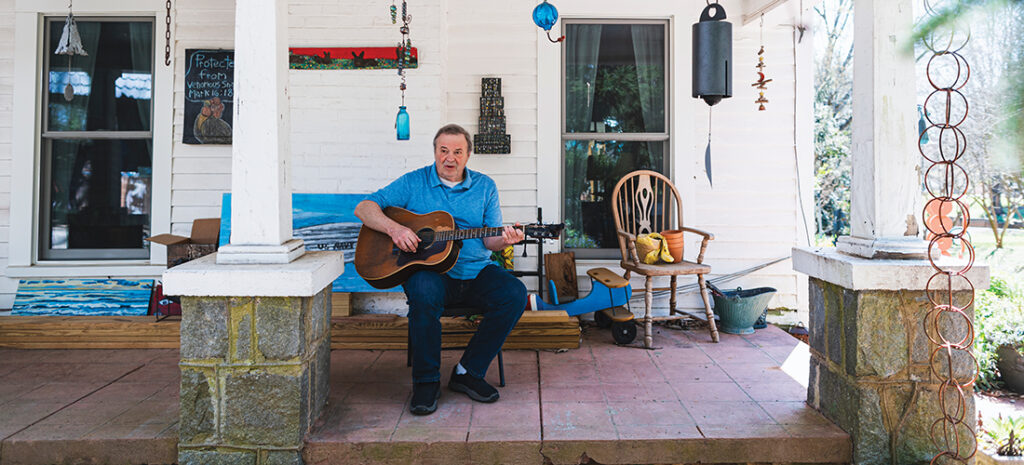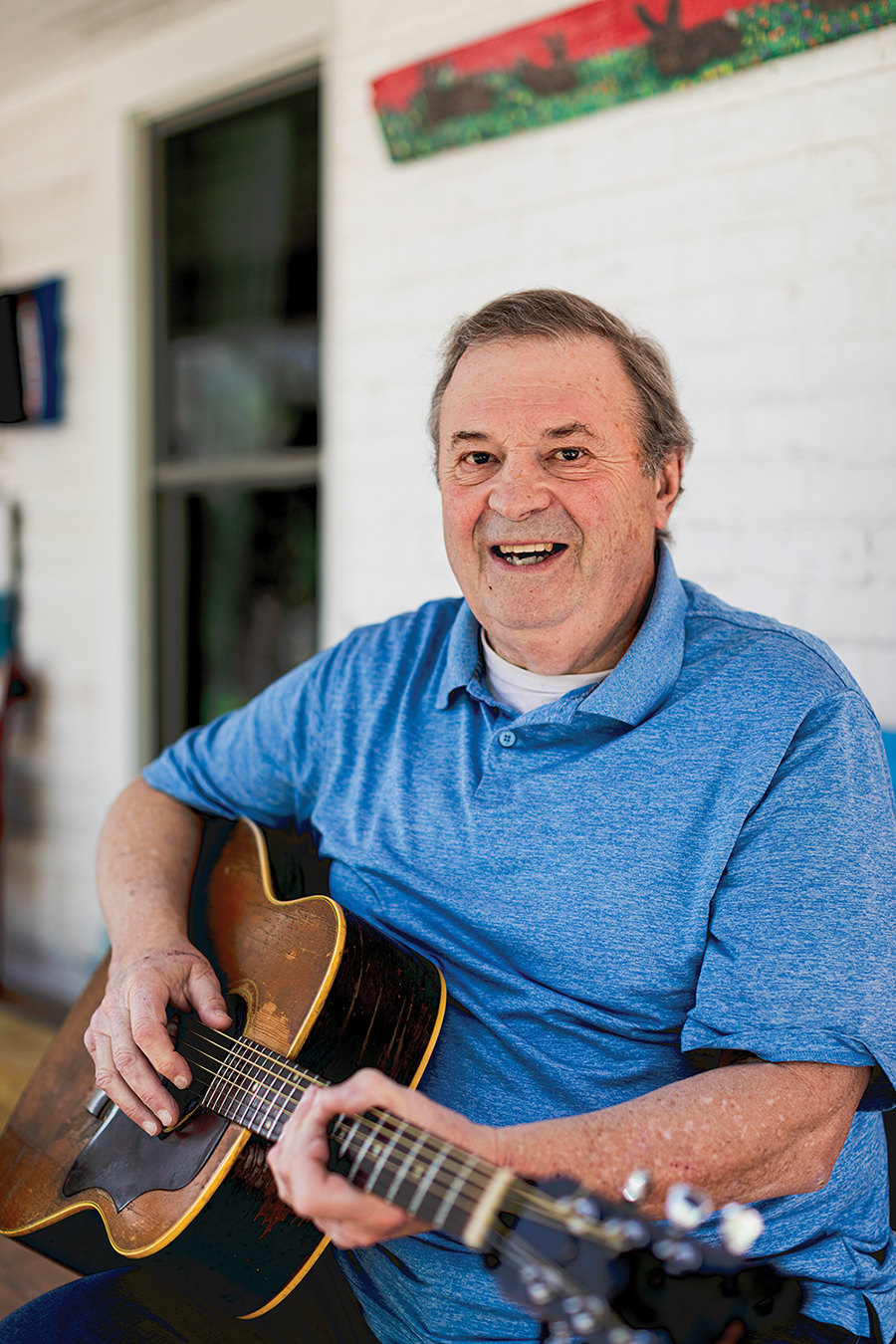Creators of N.C.

The Late Drive Home
The music of David Childers
By Wiley Cash
Photographs By Mallory Cash
 One chilly evening in early March, I parked in front of WiredCoffeeEspress in Kannapolis, North Carolina. I waited in the car for a few moments, wondering if I had the right place. The coffee shop sat in a strip mall between a discount store and a supermercado, and it seemed like a surprising spot to find one of my favorite living musicians on a Tuesday night. But then I remembered that I was there to see Mount Holly native David Childers, a universally beloved songwriter who is as at home sitting in on an intimate showcase of local musicians in front of a weeknight crowd as he is performing with the Avett Brothers in the Greensboro Coliseum.
One chilly evening in early March, I parked in front of WiredCoffeeEspress in Kannapolis, North Carolina. I waited in the car for a few moments, wondering if I had the right place. The coffee shop sat in a strip mall between a discount store and a supermercado, and it seemed like a surprising spot to find one of my favorite living musicians on a Tuesday night. But then I remembered that I was there to see Mount Holly native David Childers, a universally beloved songwriter who is as at home sitting in on an intimate showcase of local musicians in front of a weeknight crowd as he is performing with the Avett Brothers in the Greensboro Coliseum.
Inside I found Childers already seated on the small stage, tuning his acoustic guitar and adjusting the harmonica holder around his neck. He and two other men about his age spent the next hour-and-a-half taking turns playing original songs, each performing five or six numbers. I knew most of the songs Childers played, but I couldn’t help but be struck by their beauty and nuance, how he was able to create rich tension between two lines that revealed a complicated duality that most songwriters aren’t capable of reaching for, much less grasping.
“There are moments of greatness,” he sang during his last song of the evening, “but this ain’t one of those.”
He could’ve fooled me.
By 10 p.m. Childers and I were sitting at a table on the sidewalk in front of the coffee shop as patrons loaded into their cars and trucks to head home for the evening, but not before several of them stopped by our table to say hello. One of them offered Childers condolences on the recent passing of Malcolm Holcombe, a singer/songwriter from western North Carolina whom Childers knew for years and who recently lost a long battle with cancer. Childers had honored his friend that evening by performing one of Holcombe’s songs.
“I’m sorry we lost Malcolm,” the man said.
“Yeah,” Childers responded, “but I think Malcolm’s in a better place.” He smiled a sly smile. “We’ll probably run into him.”
Holcombe and Childers came up together in the North Carolina music scene, two literary singer/songwriters who both seemed haunted by the South, its religious iconography, its mystery, and its hardscrabble economics. Both men released their debut albums in 1999 and spent the years before and after touring incessantly, making regular jaunts across Europe.
“I couldn’t get a gig around here in Charlotte,” Childers said, referring to a time when most bars wanted cover bands, not poets with guitars singing blue collar stories about mill closures and lost souls. “I was pretty much by myself, although I would get these bands together and eventually started getting gigs. One place was Dilworth Brewing. That let me get some experience because I started late.” Childers, in his mid-60s now, was around 38 years old when he began performing publicly while he and his wife, Linda, raised a young family, all while Childers worked 50 and 60 hours a week as an attorney in Mount Holly.
In 2007 he looked around and decided that life on the road wasn’t for him, especially when he realized that by the end of November he’d only spent four weekends at home during the entire year. There were things he wanted to do in Mount Holly: spend time with his wife and kids, work in the yard, paint.
“I’d been playing overseas, and there had been some good things, but there was a lot of disappointment, a very mixed bag. And I just realized, I don’t want to be in an airplane all the time or in strange hotels or riding in buses and cars. And Charlotte was changing, North Carolina was changing. The music scene was opening up, and I was getting more of a name, so I had more opportunities. Why fly all over the place if you can stay here and make a living?
“I don’t have the wanderlust anymore,” he said. “I don’t really want to go anywhere.”
And that makes sense if you listen closely to Childers’ more recent music, almost all of which is firmly grounded in the Mount Holly soil that rests along the Catawba River dividing Gaston and Mecklenburg counties. The songs from The Next Best Thing (2013), Run Skeleton Run (2017), Melancholy Angel (2023), and especially 2020’s Interstate Lullaby play like soundtracks of mill culture, zeroing in on the hope born in the post-war years of the 1950s and the despair felt once the lifeblood of local industries began to seep away.
“It’s there in those songs,” he said. “Those two emotions — hope and despair — they give you a conflict, and that’s a good thing to have in a song.”
A young man was standing nearby, and Childers looked up and saw him.
“Hey, man,” Childers said. He shook the young guy’s hand. “I’m glad you came out. I’ve seen you play.”
The guy seemed surprised and genuinely touched, and before walking toward the parking lot he invited Childers to an upcoming show. Childers promised to try and make it.
“That boy’s a hell of a songwriter,” Childers said.
We talked for a few more minutes, and then it was time for Childers to step inside the coffee shop to pack up his gear. I asked him how long the drive home to Mount Holly would take.
“It’s about 40 minutes,” he said. He stood from his chair and stretched his back.
I apologized for keeping him so long after the show ended.
“It’s OK,” he said. “It was a good show, and it was nice to chat.”
“I hope it was worth the late drive home on dark roads,” I said.
He smiled. “Hope and despair,” he said. PS
Wiley Cash is the executive director of Literary Arts at the University of North Carolina at Asheville and the founder of This Is Working, an online community for writers.
